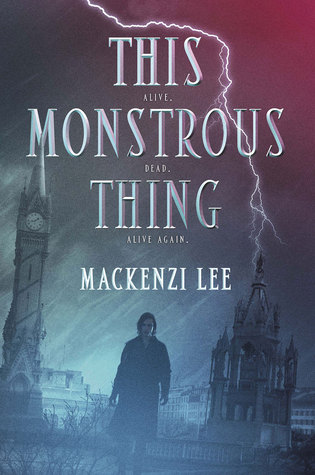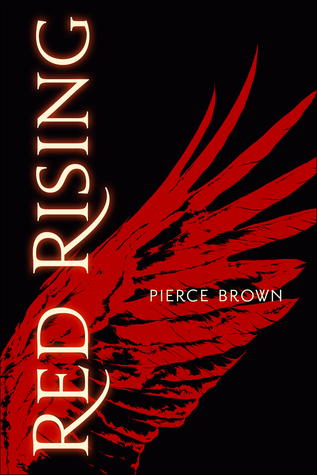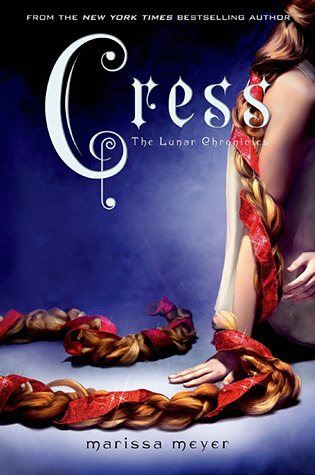 Mackenzi Lee's debut, This Monstrous Thing, reimagines Frankenstein in an alternate steampunk world, where the resurrection is accomplished through gears and gadgets. So far, the book is easy enough to sum up. But Lee has done much more with this retelling. It's a lovely homage to the original, down to the inclusion of Mary Shelley herself as a complicated character. The historical details shine, creating a vivid story world. But the heart of the story is the relationship between brothers Oliver and Alasdair--and in keeping with real sibling relationships, this heart is complicated, bruised, hopeful, loving, powerful.
Mackenzi Lee's debut, This Monstrous Thing, reimagines Frankenstein in an alternate steampunk world, where the resurrection is accomplished through gears and gadgets. So far, the book is easy enough to sum up. But Lee has done much more with this retelling. It's a lovely homage to the original, down to the inclusion of Mary Shelley herself as a complicated character. The historical details shine, creating a vivid story world. But the heart of the story is the relationship between brothers Oliver and Alasdair--and in keeping with real sibling relationships, this heart is complicated, bruised, hopeful, loving, powerful.
Showing posts with label science fiction. Show all posts
Showing posts with label science fiction. Show all posts
Wednesday, January 20, 2016
This Monstrous Thing
 Mackenzi Lee's debut, This Monstrous Thing, reimagines Frankenstein in an alternate steampunk world, where the resurrection is accomplished through gears and gadgets. So far, the book is easy enough to sum up. But Lee has done much more with this retelling. It's a lovely homage to the original, down to the inclusion of Mary Shelley herself as a complicated character. The historical details shine, creating a vivid story world. But the heart of the story is the relationship between brothers Oliver and Alasdair--and in keeping with real sibling relationships, this heart is complicated, bruised, hopeful, loving, powerful.
Mackenzi Lee's debut, This Monstrous Thing, reimagines Frankenstein in an alternate steampunk world, where the resurrection is accomplished through gears and gadgets. So far, the book is easy enough to sum up. But Lee has done much more with this retelling. It's a lovely homage to the original, down to the inclusion of Mary Shelley herself as a complicated character. The historical details shine, creating a vivid story world. But the heart of the story is the relationship between brothers Oliver and Alasdair--and in keeping with real sibling relationships, this heart is complicated, bruised, hopeful, loving, powerful.Tuesday, July 29, 2014
Red Rising
 Lots of books have been compared to The Hunger Games--by publicists, by wanna-be-writers, publishers, and more.
Lots of books have been compared to The Hunger Games--by publicists, by wanna-be-writers, publishers, and more.Most of them don't live up to the hype.
This one, with a cover blurb bravely comparing the hero to Ender Wiggins and Katniss, actually does.
It's a frenetic, wild, violent read. I thought about it when I wasn't reading, and when I was reading, I stopped only reluctantly.
In a futuristic society, where one's future is determined by one's caste, Darrow is a red, the lowest of the low. His people mine underneath the surface of Mars, searching for a mineral that will help terraform the planet and make it habitable--they are told--for the other color castes seeking refuge from earth.
At sixteen, Darrow is already married and a man--a helldiver for his Lykos clan. He dreams of revolution, as his father did, but mostly he just works and lives as hard as he can. Reds don't tend to live long.
But when the unthinkable happens and Darrow loses nearly everything he cares for, his dreams change. He's given a mission by a secret society: infiltrate the Golds, the highest of the castes. With some surgical assistance, Darrow is transformed: his face, his body, his eyes, even his brain.
Darrow manages to make it into the Institute, where the ruling Golds are made Peerless (scarred warriors who are strong, ruthless, and committed to maintaining their power). And there, everything starts changing.
For starters, there's the passage--a bizarre, horrible Darwinian rite of passage. (This book is not for the faint-hearted. Or the very young. While it's rated YA for the protagonist's age, it's definitely violent).
Then there's the Institute's war games, where Darrow and forty-nine others are drafted into house Mars and have to compete against 11 other houses (all based on Roman gods). The resulting rivalries are no-holds barred fighting, meant to teach the students how to fight, how to cheat, how to survive--and how to become leaders.
Darrow fails. A lot. He makes stupid mistakes. A lot. But, impressively, he grows.
So often novels like this are focused on the plot and world-building--but Darrow, despite his impressive intelligence and physical skills, is not perfect. His character arc in the novel was painful, heart-wrenching, but felt believable.
Of course, not everything in the novel was believable. (For one, why is it that none of the Gold children knew what the Passage was? Presumably, the leaders have made it through. Also presumably, they would have told their children what to expect--or at least made sure they could survive it.)
But the plot and characters kept surprising me, and I raced through the book.
By the end, I'll admit, I was a little tired of the violence. But I think that's part of the point: the cost of maintaining a hugely unequal class society. And the cost of absolute power.
Definitely worth-reading--particularly for fans of The Hunger Games, Ender's Game, John Scalzi's Old Man's War and other sci-fi/dystopian rebellions.
Labels:
#74,
class system,
dystopian,
intense,
rebellion,
science fiction,
YA
Monday, July 7, 2014
Cress
Marissa Meyer's Cress, as almost everyone who reads YA is aware, is the third book of her Lunar Chronicles, futuristic retelling of well-known fairy tales. I loved Cinder (who doesn't like a cyborg version of Cinderella?), enjoyed Scarlet, but I have mixed-feelings about Cress (which apparently puts me in a minority).
 Don't get me wrong. I'm still attached enough to characters that I will undoubtedly read the rest of the series. But Cress felt uneven to me--sometimes fast-paced, but sometimes dragging. And while I like all the characters, here Meyer tries to cover so many perspectives that a few of the characters (Wolf and Scarlet, for instance), feel a little flat and/or don't have enough to do. It also seems a little *too* convenient that each of the title characters has a ready-to-hand love interest. I guess that's part of the fairy tale retelling, but I would have liked to feel a little more surprise.
Don't get me wrong. I'm still attached enough to characters that I will undoubtedly read the rest of the series. But Cress felt uneven to me--sometimes fast-paced, but sometimes dragging. And while I like all the characters, here Meyer tries to cover so many perspectives that a few of the characters (Wolf and Scarlet, for instance), feel a little flat and/or don't have enough to do. It also seems a little *too* convenient that each of the title characters has a ready-to-hand love interest. I guess that's part of the fairy tale retelling, but I would have liked to feel a little more surprise.
I did like that Cress wasn't quite as kick-ass as Cinder and Scarlett--this felt realistic given that, as a Lunar Shell (lacking the characteristic Lunar glamor), she's grown up trapped on a space ship orbiting earth and lacked the opportunities to develop the kind of toughness the other characters have. That said, she has her own strengths, and I liked that she was able to use her hacking skills to help the others. I also like the way the stakes continue to build in the series, as Cinder and the others try to force the Lunar queen Levana out of office and save the world. I like it--I just didn't love it this time around.
 Don't get me wrong. I'm still attached enough to characters that I will undoubtedly read the rest of the series. But Cress felt uneven to me--sometimes fast-paced, but sometimes dragging. And while I like all the characters, here Meyer tries to cover so many perspectives that a few of the characters (Wolf and Scarlet, for instance), feel a little flat and/or don't have enough to do. It also seems a little *too* convenient that each of the title characters has a ready-to-hand love interest. I guess that's part of the fairy tale retelling, but I would have liked to feel a little more surprise.
Don't get me wrong. I'm still attached enough to characters that I will undoubtedly read the rest of the series. But Cress felt uneven to me--sometimes fast-paced, but sometimes dragging. And while I like all the characters, here Meyer tries to cover so many perspectives that a few of the characters (Wolf and Scarlet, for instance), feel a little flat and/or don't have enough to do. It also seems a little *too* convenient that each of the title characters has a ready-to-hand love interest. I guess that's part of the fairy tale retelling, but I would have liked to feel a little more surprise.I did like that Cress wasn't quite as kick-ass as Cinder and Scarlett--this felt realistic given that, as a Lunar Shell (lacking the characteristic Lunar glamor), she's grown up trapped on a space ship orbiting earth and lacked the opportunities to develop the kind of toughness the other characters have. That said, she has her own strengths, and I liked that she was able to use her hacking skills to help the others. I also like the way the stakes continue to build in the series, as Cinder and the others try to force the Lunar queen Levana out of office and save the world. I like it--I just didn't love it this time around.
Wednesday, June 11, 2014
Inside Job
 Connie Willis is one of my favorite sci-fi authors: her To Say Nothing of the Dog is one of my favorite books. So I was thrilled to see a book I hadn't read of hers. And while I would agree with other reviewers that this isn't her best, it was still a fun, enjoyable read.
Connie Willis is one of my favorite sci-fi authors: her To Say Nothing of the Dog is one of my favorite books. So I was thrilled to see a book I hadn't read of hers. And while I would agree with other reviewers that this isn't her best, it was still a fun, enjoyable read.Rob owns and writes for the Jaundiced Eye, a professional debunking magazine. When his lovely assistant (and sole employee) Kildy brings him reports of a new psychic, he's not exactly interested--the psychics are all the same. But when Kildy drags him to a session, he's intrigued despite himself: the psychic, Ariaura, appears to be channeling one of Rob's literary icons--H.L. Mencken. And Ariaura doesn't appear to know she's doing it. Soon, Rob is convinced that Ariaura isn't clever enough to pull this off on her own--it has to have been an inside job. But who is helping her?
This was a clever combination, part mystery, part romance. And if I saw the ending coming, I still enjoyed the ride.
Monday, March 31, 2014
Sky Jumpers
 (Whitney Finalist, middle grade)
(Whitney Finalist, middle grade)Peggy Eddleman's Sky Jumpers is a terrific middle grade novel--it's easy to see why it's been getting all the buzz it has. It's got a great action sequence combined with heart, and should appeal to most young (and not-so-young) readers.
After the green bombs of World War III wipe out most of humanity (but don't destroy the planet because they're "green"), the survivors struggle to rebuild their communities. Some fifty years or so after the war, 12 year-old Hope lives in a unique community in White Rock, a rich farming community inside a bomb crater, protected from marauding bandits by a ring of deadly, super compressed air known as "Bomb's Breath." Because so much of the pre-war technology was lost, Hope's community values inventors and inventions above anything else. And Hope--who is smart, funny, and courageous--is a lousy inventor. What she likes to do, more than anything else, is jump through the "Bomb's Breath," where the denser air catches her and slows her fall.
But when bandits find a way into White Rock and demand the last of their critical medical supply, Hope realizes it's time for her to use her strengths. Since the bandits only count adults and youth 14 and up, Hope and her friends are able to sneak away. But it takes all of her considerable smarts and resourcefulness to find the help her town desperately needs.
Eddleman's writing is pretty straight-forward and unadorned, but that works perfectly for this novel, as it doesn't get in the way of the action. But what I liked best was that, in addition to the great concept, Hope has a rich character development, as she finds a way past her concerns about fitting in and making her parents proud. The central message--to find your strengths and use them--is one that all children need to hear.
Subscribe to:
Comments (Atom)